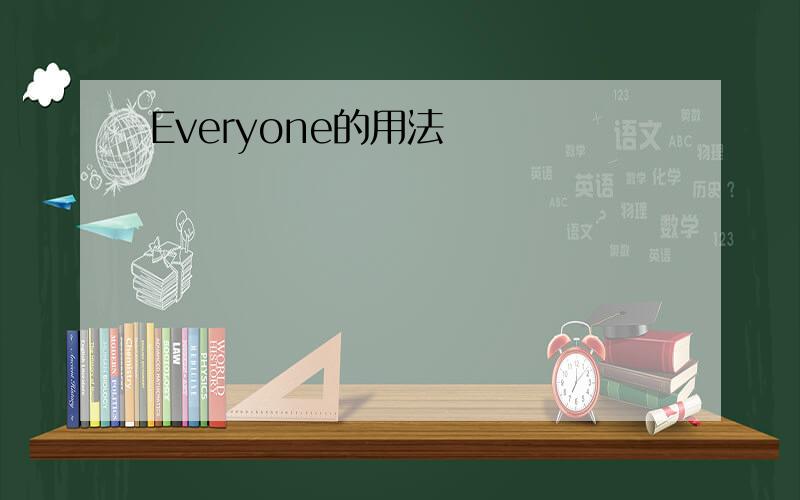Everyone的用法
来源:学生作业帮助网 编辑:作业帮 时间:2024/11/30 23:03:45

Everyone的用法
Everyone的用法
Everyone的用法
你应该多看例句,用金山词霸这种软件查的话,可以基本解决,不过有的用法他也没有,如果你想全面了解,最好多差几个词典.最好的办法是看例句里的用法,心里揣摩.
比如下面的例句:(来自于金山词霸),涉及到了两种意思,
1.PRON-INDEF(某个群体中的)每个人,所有人You use everyone or everybody to refer to all the people in a particular group.
Everyone in the street was shocked when they heard the news...
听到那条消息,街上所有的人都震惊了.
When everyone else goes home around 5 p.m. Lynn is still hard at work...
当其他所有人都在晚上5点左右回家时,林恩仍在努力工作.
Not everyone thinks that the government is being particularly generous.
并非所有人都认为政府特别慷慨.
2.PRON-INDEF所有人;人们You use everyone or everybody to refer to all people.
Everyone feels like a failure at times...
人们有时会觉得自己是个失败者.
Everyone needs some free time for rest and relaxation...
每个人都需要一些休息和放松的自由时间.
You can't keep everybody happy.
你不能使每个人都满意.
“everyone”的用法通常是在与其他次的比较之中能够更好地理解,(下一段是金山词霸的柯林斯辞典中提供的everyone和every one的区别 )
Usage Note:
Do not confuse everyone with every one. Everyone always refers to people. In the phrase every one, 'one' is a pronoun that can refer to any person or thing, depending on the context. It is often followed by the word of. We've saved seeds from every one of our plants... Every one of them phoned me. In these examples, every one is a more emphatic way of saying all.
不要混淆everyone和every one.everyone总是指人.在短语every one中,代词one根据语境可以指任何人或事物,后面常接of:We've saved seeds from every one of our plants(我们保存了每一样植物的种子),Every one of them phoned me(他们每个人都给我打了电话).在这些例句中,every one是all的一种强调说法.
如果你是初中生,相信下面的对你做选择题很有帮助,
1). each可作代词和形容词,而every只能用作形容词,如可以说each of these dictionaries或each one of these dictionaries, 但不能说every of these dictionaries, 但可改用every one of these dictionaries.
2). each可指两个或两个以上中的“每一个”,而every只可指三个或三个以上的“每一个”,不能指两个中每一个.如: 可以说each of my hands, 不可说every one of my hands.
3). every+基数词+复数名词 = every+序数词+ 单数名词,作“每(多少)”解.
如:every three days=every third day
every two days, every second day都作“每隔一天”解,但在实际应用中,人们更倾向用every other day来表示这一意思,every two days也有人用,而every second day则比较少见.
4).each 可以与other构成固定的搭配,即each other意思为“彼此、相互、互相”,而every则不能.
each other=one another
5).everyone指三者及三者以上的人或物,侧重全体,其后不能接of,但every one则可以.如:
(×) everyone of them
(√) every one of them
可参看http://www.langlangjiajiao.com/art-nid_323.html